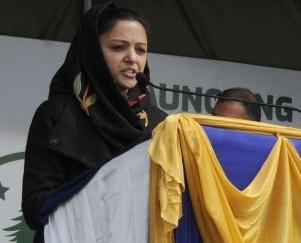 | « Back to article | Print this article |
Shehla doesn't and has never shied away from talking the tough talk and walking the tough walk, says Gurmehar Kaur.
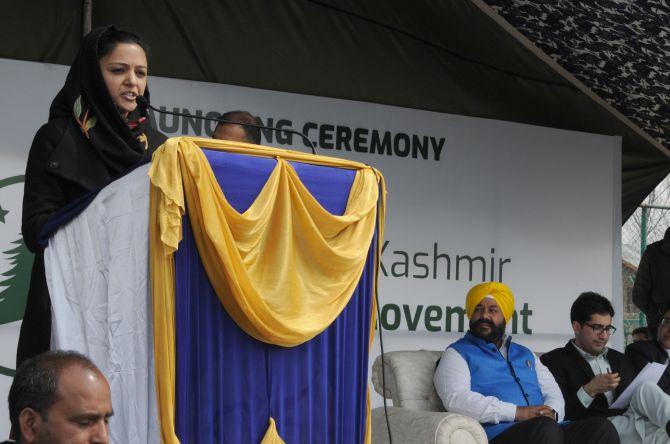
To a bystander she would just be another husky voiced, slender, young, beautiful university student, but anyone who has seen Shehla Rashid lead the JNU agitation knows that behind the delicate grace that she presents she is a force to be reckoned with.
There is no leader in India she would not call out and there is no issue she is too shy to pick up.
I wondered how she did it. Day after day she kept poking the beast and facing the repercussions only to come back stronger when I would get deeply affected by some faceless troll's comment.
A point came when I realised that if Shehla Rashid could do it then so could I, and I think that's all that I needed to find myself in the whirlwind of Indian politics -- another young woman paving the way for many more.
Before Shehla Rashid landed on the political scene with the JNU row, no one could've imagined a young Kashmiri Muslim woman taking on the most powerful men in the country and giving them sleepless nights with her fiery speeches and mass reach in mainstream India.
Personally, I'm glad for her. In a way, with her entrance into the mainstream imagination, she shattered many myths about Kashmiris, but her identity is as much a hassle for her as it is her tool.
She is a feminist born into a Muslim family and has been as critical about the portrayal of women in Islam as she has been of the treatment of Hindu women in a patriarchal Brahmanical Hindu society.
When you're born in one of the most volatile conflict zones in the world, you're born into the heart of politics and there is no escaping it.
But growing up, Shehla did not realise that the environment that she lived in was not normal.
'In Srinagar, we didn't know about anything -- we didn't know about the conflict. We didn't realise we were in a conflict zone because there was no talk of the conflict back in those days.'
'You didn't have cable TV, you had satellite dish but only some families had it -- the better off families. So we only had Doordarshan which was like reading out a press release.'
'Even in the family we would never talk about the conflict. We would never talk about what's going on. Maybe in other households it was talked about, but not in mine. We were just miles away from it and it was almost as if there was nothing happening.'
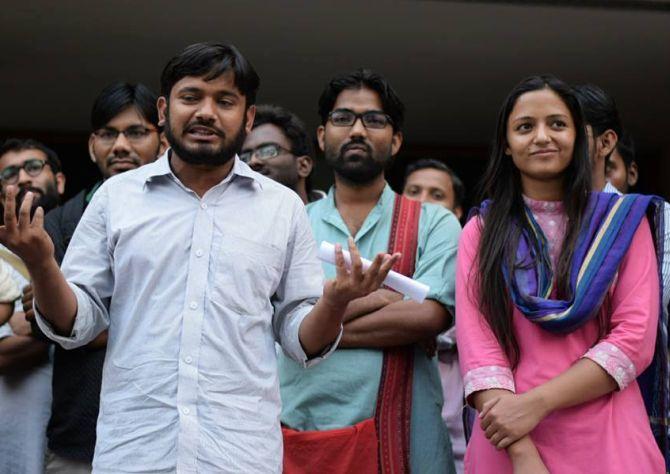
The first time Shehla and her generation had an awareness of the conflict was in 2010, after five long months of protests post an incident where the Indian Army claimed to have killed three 'Pakistani infiltrators', but it was later revealed to be a case of a fake encounter in which a soldier of the territorial army, a counter-insurgent and a former special police officer had lured three young men from Nadihal village in Baramulla district and killed them at Sona Pindi.
The initial reactions of Shehla and her friends were similar to that of many mainland Indians upon witnessing the recent 2016 Burhan Wani agitation.
'Initially, we were also like, "Why are these students pelting stones? Yeah, obviously they will get killed if they pelt stones". But at the same time there was a Jat agitation going on somewhere in Maharashtra or Haryana, I'm not sure, and they also pelted stones on the police and there was no firing against them. And that's when I first began asking this question.'
'If the Jats were pelting stones then why weren't they being fired upon? Why were people here being fired upon? Hundreds of youth died and many people became disabled because of the whole thing. This is when we first started asking questions.'
'So 2010 has been a landmark year in our generation's time because that's when we first gained an awareness of the conflict.'
I asked her if that's when she realised she wanted to be an activist.
'You know, I can't say I realised I wanted to be an activist, but I must say that we had our first expressions of anger and these were mostly on social media.'
'We for the first time expressed the anger. It began simply as an expression of anger, and nothing else.'
'There were also the 2008-2009 agitations that had happened, but it really was 2010 when everyone became aware of the conflict. We started asking questions on social media and Twitter was new in those days. On Facebook, we would write opinions and express our concerns. That's how it began.'
On social media, Kashmiri voices were raw, unfiltered and from the heart. There was hope that there could be a resistance.
'These writings started out as expressions of anger and then people began to organise themselves online. In 2012, there was this young boy who was arrested and he was treated like an adult. He was just 12 years old, but he was handcuffed. You are not supposed to handcuff juveniles and his wrists were so slender that the handcuffs kept slipping from his wrist and when he was being arrested, there was a picture of his sister trying to feed him Uncle Chips. So these were very heartbreaking moments.'
'That was when a lot of us organised online because you can't organise offline. There is a huge likelihood of violence by the police or armed forces. There may be risks and you may still be charged with sedition etc., but we did manage to get a few victories.'
'For example, there was another teenager called Faizan who was arrested. So the hashtag #freefaizan was, I think, the earliest campaign by Kashmiris on Twitter and back then we could organise. Liberal people, radical people, we all organised online.'
'Today, things have become much more polarised. If you are a liberal today, you won't be able to work together with the more radical people.'
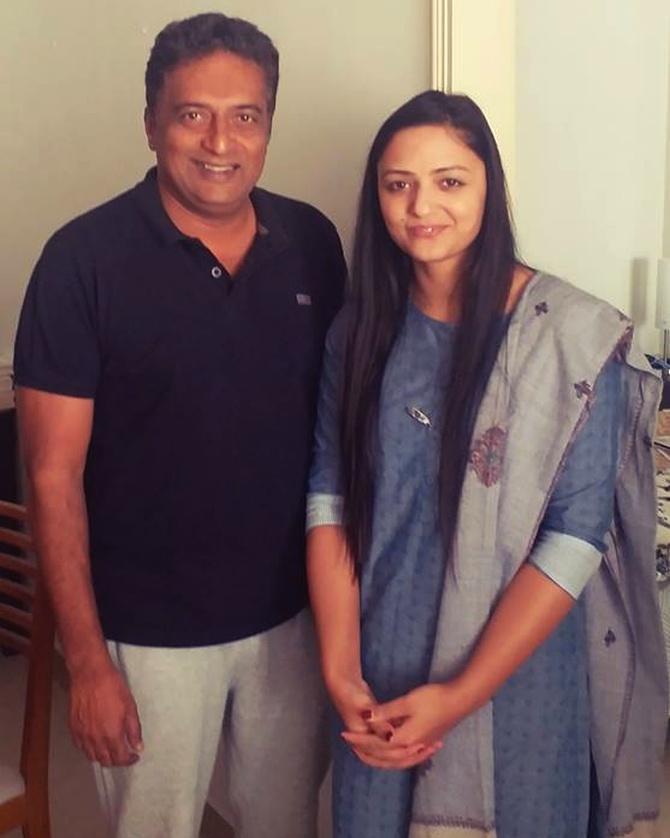
Tremors of polarisation that the Hindi heartland had been experiencing since the Modi government were felt in Kashmir too, but in their own way.
Those who wanted azaadi now wanted it even more badly and those who were more moderate, who just wanted the war in paradise to end, were now being considered traitors by their own people.
I wonder out loud if Shehla believes that the youth will eventually be responsible for bridging this gap and if she sees herself as that young woman who has grown up on the streets of Srinagar and came of age in the capital, as she claimed the streets with her loud naaras, slogans, as her own.
'One hopes so. I mean, I hope to be that person but I would be lying if I said that it is already happening. I do try to talk to people who pelt stones, young boys, because they do see me as someone different and not as just another politician.'
'But the problem is the moment I enter politics and they see me as entering politics, there is some sort of a distance.'
She is not delusional. She knows it is not as easy for her to be a part of the electoral system without offending those whose concerns matter the most to her.
The biggest challenge for this young gun is not voicing concerns that most wouldn't -- Shehla doesn't and has never shied away from talking the tough talk and walking the tough walk.
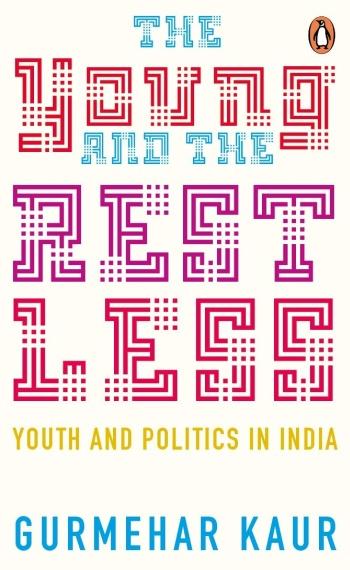
But the challenge is to find a space where she is loved and accepted wholeheartedly by her own people.
'Politics is public service, isn't it? If you really think about it.'
'And that's supposed to be a politician's only job but in the process, they also make a lot of fortune for themselves which they are not supposed to do.'
I see the struggle between the student activist and the hopeful candidate.
Her voice is so sure and confident as she talks about corruption in politics but when it comes to talking about placing her own self in the system she has criticised for the longest time, there is hesitance.
The people who she grew up with and those who she calls her own, and those she fought for tooth and nail while in Delhi, see her as someone else ever since her political career saw a boom.
She has studied in Kashmiri schools and university, she does not come from a political dynasty -- she is no Mehbooba Mufti, neither is she an Omar Abdullah -- that there will be a distance between her and the others.
On her own merit and capabilities she has created a space and a name for herself and yet she isn't an inspiration, but another.
It breaks my own heart for I have known her journey and thoughts intimately in the two years we have known each other.
We have shared our beliefs, fears and apprehensions of being in the spotlight and on the hit list of the most powerful at a young age.
But there is one Shehla that has come out from Srinagar and as I look around myself I know there are so many just burning to find that voice.
Excerpted from The Young and the Restless: Youth and Politics in India by Gurmehar Kaur, with the kind permission of the publishers, Penguin Random House India.
